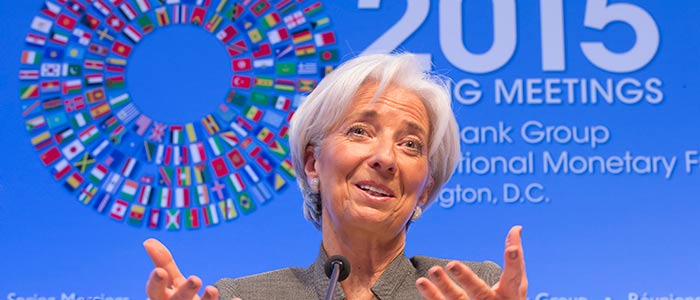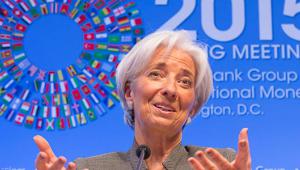WEb_IMF_ChristineLagarde_17169021875_5ac675797e_o.jpg

Christine Lagarde. Credit: IMF Staff Photo/Stephen Jaffe
The charge carries penalties of a fine of up to €15,000 ($15,917) and a jail term of up to one year. The judge declined to hand either down to Lagarde, or give her a criminal record as a result of the decision.
However the guilty verdict throws some doubt on her legitimacy as managing director of the world’s foremost financial institution, which is currently trying to navigate a number of difficult issues including a dispute over Greece’s third bailout.
The fund’s executive board, which put Lagarde forward as their only candidate to head the IMF last year despite the prospect of the trial, has voiced their continued support for the managing director.
In a short statement responding to the news, the board referred to her “outstanding leadership” and the “wide respect and trust” she commands globally. It “reaffirmed” its confidence in her ability to continue heading the fund.
“The board looks forward to continuing to work with the managing director,” it continued, adding that under the fund’s governance framework Lagarde will work under its direction.
In a statement yesterday, Lagarde thanked the board and IMF staff for their continued support throughout the five-year “ordeal”, culminating in five days of a “very painful process”.
“I have been held negligent but without penalty, without sanction and without registration of the decision,” she said. “I am not satisfied with it but there is a time when one just has to stop, turn the page and move on and continue to work with those that have put their trust in me.”
Lagarde, who is now in her second term at the helm of the IMF, was convicted of negligence for her part in a rare out-of-court settlement payment to French business tycoon Bernard Tapie in 2008.
She said yesterday she would not appeal the decision.
The payment, which cost the French taxpayer €403m ($428), is suspected of being politically motivated – an offering to Tapie in return for his support for then-president Nicolas Sarkozy.
Lagarde signed off on the payment but denied negligence and giving Tapie any special treatment or acting on Sarkozy’s orders. After an unsuccessful appeal against the charges, she made her case at a special French court for public officials accused of crimes related to their positions.
Yesterday she reiterated: “All along in my professional life, including as head of the IMF, I have discharged my duties in full responsibility, in conscience, in confidence and with a clear focus on the public interest.”
The dispute between Tapie and French state-owned bank Credit Lyonnais was already more than 10 years old when it landed on Lagarde’s desk in 2008 – as her lawyer pointed out today, in the midst of the financial crisis.
Tapie had accused the bank of undervaluing his share in sportswear company Adidas in a sale, then selling it later for a profit. By the time Lagarde signed off on the payment, Credit Lyonnais had collapsed and so the settlement funds came from the public purse.
Lagarde was not present in court of hear the verdict, as she had flown back to Washington DC, where the IMF is based. A number of others are also under investigation in relation to the payment.
While Lagarde still commands wide support within the fund and from member states, the guilty verdict could somewhat destabilise her legitimacy and prove another headache for the fund, whose managing directors have been plagued by scandal.
Lagarde was brought in to replace Dominique Strauss-Kahn, who resigned amid sexual assault allegations.












